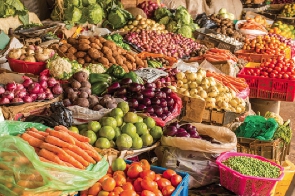 File photo: Foodstuff displayed
File photo: Foodstuff displayed
The Development Bank Ghana (DBG) has initiated efforts to address challenges in some key sub-sectors in the agricultural industry, as part of plans to boost food security and reduce the weight of food imports on the cedi and economy at large.
The bank is currently engaging stakeholders to identify potential challenges and engender solutions to address them. The engagements are focused on the poultry, rice and maize as well as soyabeans value chains. The average annual import bill for poultry and rice alone constitutes about US$700million and US$1billion, respectively.
Speaking to the media in Accra after a stakeholder engagement, the Deputy Chief Executive Officer of DBG, Michael Mensah-Baaah, said his outfit is engaging policymakers, commodity producers and other stakeholders involved in the chain to identify potential challenges and areas of concern.
Mensah-Baah explained that solutions to the problem will be multifaceted and may include fertiliser, financing and policies. The approach aims to strengthen food security.
Following the event in Accra, he said the bank will embark on further engagements with value chain players at the regional level to understand different aspects of the value chain; such as production, processing, transportation, packaging, financing and policies, and how they can work together to provide comprehensive solutions.
By engaging with all stakeholders, the DBG aims to identify root-causes of the problem and find sustainable solutions. The bank is a critical institution intended to reshape and strengthen the country’s financial architecture, and make it more supportive of the private sector.
DBG will focus predominantly on economic transformation, particularly industrialisation and value-addition in agriculture.
With the DBG’s total available resources of both equity and debt currently at about US$750million, Mr. Mensah-Baah emphasised that: “It is important to note that the solution to problems of food security is not just about throwing money at it. Instead, it requires a deeper understanding of the challenges faced by local producers and the entire value chain”.
Mr. Mensah-Baah stated that technical assistance will play a crucial role in helping local producers address the challenges they face. This could involve providing training and support on different aspects of production; such as storage, transportation and packaging. It could also involve working with banks to increase access to financing for local producers.
Success for the approach will depend on the commitment and collaboration of all stakeholders. By working together, it is possible to reduce dependence on imports and ensure there is sufficient food for the local population. This will not only improve food security, but also support economic development and create opportunities for small businesses and farmers.
The poultry industry faces several financing challenges that hinder its growth and development. High-interest rates make it difficult for farmers and businesses to access affordable financing, and many commercial banks view the industry as high-risk and are reluctant to provide loans. Poultry farmers often lack sufficient collateral to secure loans, which makes it difficult for them to access financing from commercial banks.
The cost of production for poultry in Ghana is relatively higher due to factors such as feed, medication and labour costs. This high cost of production can limit profitability and make it difficult for farmers to access financing.
Watch the latest edition of BizTech and Biz Headlines below:
Watch the latest edition of Business Moments below: